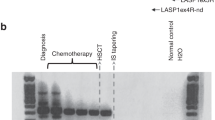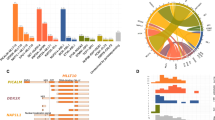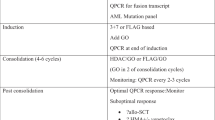Abstract
Twenty-seven patients with AML and MLL gene rearrangement were analyzed by a reverse transcriptase polymerase chain reaction (RT-PCR) for the MLL-AF9 translocation. The MLL-AF9 fusion transcript was detected in six patients. In five patients, the breakpoint of the AF9 gene was located within the recently described site A; in one patient, a novel breakpoint (AF9 site D) mapped to a position 377 bp 3′ of site A. Five patients could be serially monitored for a period of 4–23 months. Two patients became two-step PCR negative in bone marrow and peripheral blood. Molecular remission was achieved rapidly after one cycle of induction chemotherapy. Both patients are in continuous complete remission (CR) at 22 and 15 months, respectively. Two patients who had achieved hematological CR did not become PCR negative and MLL-AF9 fusion transcripts were detectable in all samples after induction and consolidation chemotherapy. One patient relapsed 5 months after achieving CR. The other patient received allogeneic bone marrow transplantation from an HLA-identical sibling 2 months after achieving hematological CR and became PCR negative 4 weeks after transplantation. In the fifth patient, hematological CR could not be achieved with two cycles of intensive induction chemotherapy, and MLL-AF9 transcripts were present in all samples tested. Our data indicate that MLL-AF9 RT-PCR is specific for the t(9;11) translocation. PCR negativity can be achieved in responding patients already 1 month after induction chemotherapy. The fast reduction of MLL-AF9 positive blast cells below the detection limit of RT-PCR seems to be a prerequisite for long-term CR. The results of RT-PCR may be useful for treatment decisions (eg BMT).
This is a preview of subscription content, access via your institution
Access options
Subscribe to this journal
Receive 12 print issues and online access
$259.00 per year
only $21.58 per issue
Buy this article
- Purchase on Springer Link
- Instant access to full article PDF
Prices may be subject to local taxes which are calculated during checkout
Similar content being viewed by others
Author information
Authors and Affiliations
Rights and permissions
About this article
Cite this article
Mitterbauer, G., Zimmer, C., Fonatsch, C. et al. Monitoring of minimal residual leukemia in patients with MLL-AF9 positive acute myeloid leukemia by RT-PCR. Leukemia 13, 1519–1524 (1999). https://doi.org/10.1038/sj.leu.2401542
Received:
Accepted:
Published:
Issue Date:
DOI: https://doi.org/10.1038/sj.leu.2401542
Keywords
This article is cited by
-
Molecular analysis of more than 140 gene fusion variants and aberrant activation of EVI1 and TLX1 in hematological malignancies
Annals of Hematology (2017)
-
Prognostic impact of t(9;11) in childhood acute myeloid leukemia (AML)
Leukemia (2003)
-
Acute myeloid leukemia with MLL rearrangements: clinicobiological features, prognostic impact and value of flow cytometry in the detection of residual leukemic cells
Leukemia (2003)
-
Monitoring minimal residual disease in AML: the right time for real time
Annals of Hematology (2003)
-
Reply to Dupont
Leukemia (2002)



